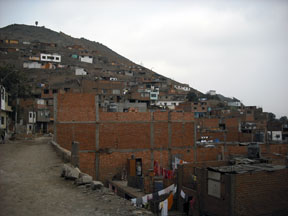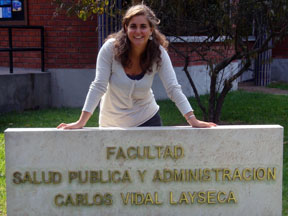By Irene Hofmeijer

Upon arrival in Peru two months ago, I was warmly welcomed by the local TGH team leader, Ines Bustamente, and the rest of the people at the FASPA-UPCH. The research that has brought me to Lima aims to explore the relationship between psychological wellbeing and the environment in the district of Independencia, located in the Northern Cone of Lima, as well as to test and validate the McGill Illness Narrative Interview (MINI). After successfully filing the mountain of paperwork formalities for approval of the research project, fieldwork began.
My first step was to develop contacts in the local community. I quickly met Maria Mendoza, a community nurse specialized in mental health, who had previously collaborated with the program. I began by sitting in on some of her consultations—which prepared me for what was to come. As reported by the World Health Organization, 51% of ever-partnered women in metropolitan Lima suffer from sexual or physical violence by a partner. At Maria’s office, I would hear many stories of such experiences and all the more when I began my interviews.
With Maria’s help, I began interviewing out of the Mental Health Unit at the health post of Ermitaño Bajo, but the setting made it difficult to make my interviewees comfortable. By chance, I interviewed a woman named Sonia, the coordinator for “Vaso de Leche” (a government program providing low income families with milk) in her area, who was very interested in the project. After a brief visit to her neighborhood, Villa El Carmen in an area called La Unificada, I was immediately attracted to its calm and town-like layout. Sonia has been a marvelous aid, accompanying me house to house as I carry out my interviews. She is a well-respected figure in her community due to role as an activist. Consequently, she has greatly facilitated my entry into the community.
So far, most women have been receptive to the project and were eager to talk about their problems. Like the stories I had heard at Maria’s office, women’s suffering stem mostly from domestic violence or economic hardship. Women feel impotent when confronted with the structural violence in which they are set, complaining of a lack of affordable support. The vicious cycle of poverty paints a bleak future for these women in a country of widening inequalities. Nevertheless, the Northern Cone of Lima has been developing at an accelerating rate and is becoming one of the main economic centers of the city, shedding some light onto these women’s futures.
